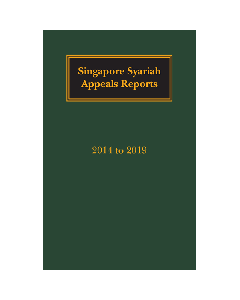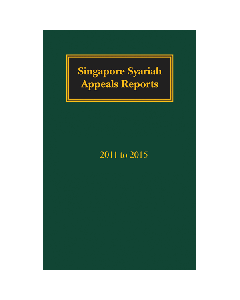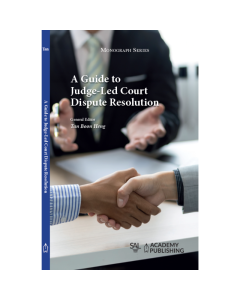-
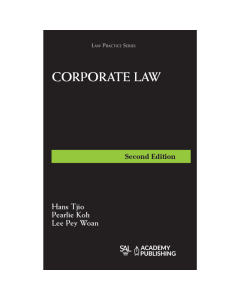
To purchase the Digital version, click here.
To purchase the Print+Digital bundle, click here.
This second edition of Corporate Law incorporates the many changes recommended by the Companies Act Working Group (“CAWG”) in May 2019. Some of them were introduced by the Companies, Business Trusts and Other Bodies (Miscellaneous Amendments) Act 2023 (Act 17 of 2023). Many of these involved the digital medium, which the COVID-19 pandemic showed that businesses required, in terms of notices, meetings, voting and communication generally. Going forward, the CAWG recognised that the Companies Act 1967 should remain as technologically neutral as possible. Continuing with the theme in the first edition, we agree that legislation should, as far as possible, permit innovation and development through changes to the corporate constitution. Even if most of the Act’s provisions are mandatory as the CAWG observed, the Act is not exhaustive of how businesses can be structured. This is perhaps seen most clearly in the new forms of fundraising that have arisen outside the regulated use of shares and debentures. The courts have led the way in recognising digital assets as forms of personal property, giving investors confidence to invest in them.
Through extensive case law analysis, this book offers invaluable insights into the changing landscape of corporate law in Singapore. It discusses judicial precedents which have significantly contributed to the development of areas of corporate law in Singapore. Explored within the pages of this book are areas including, but not limited to (a) the extent of membership rights; (b) veil piercing; (c) the permissibility of boards in approving conflict transactions carried out by their directors; (d) “core” fiduciary duties; (e) shareholder oppression in rights issues and generally in relation to corporate wrongs; (f) the no‑reflective loss principle; (g) capital maintenance and share repurchases; (h) floating charges and charge registration; and (i) liquidation generally and in the context of the restructuring of business trusts and partnerships.
Authors: Hans Tjio, Pearlie Koh, Lee Pey Woan
Year of Publication: 2024
Page Extent: 944 pages
Member's Price: $90.00 (before GST)
Associate Student's Price: $72.00 (before GST)
Non-Member's Price: $135.00 (before GST)
-
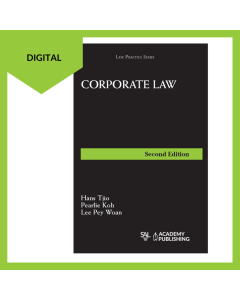
Please note that the digital copy can only be accessed via Academy Library, SAL’s proprietary eBook reader. The digital copy cannot be downloaded and is not available in any other format (e.g. PDF). For more information, please visit our FAQ page.
This second edition of Corporate Law incorporates the many changes recommended by the Companies Act Working Group (“CAWG”) in May 2019. Some of them were introduced by the Companies, Business Trusts and Other Bodies (Miscellaneous Amendments) Act 2023 (Act 17 of 2023). Many of these involved the digital medium, which the COVID-19 pandemic showed that businesses required, in terms of notices, meetings, voting and communication generally. Going forward, the CAWG recognised that the Companies Act 1967 should remain as technologically neutral as possible. Continuing with the theme in the first edition, we agree that legislation should, as far as possible, permit innovation and development through changes to the corporate constitution. Even if most of the Act’s provisions are mandatory as the CAWG observed, the Act is not exhaustive of how businesses can be structured. This is perhaps seen most clearly in the new forms of fundraising that have arisen outside the regulated use of shares and debentures. The courts have led the way in recognising digital assets as forms of personal property, giving investors confidence to invest in them.
Through extensive case law analysis, this book offers invaluable insights into the changing landscape of corporate law in Singapore. It discusses judicial precedents which have significantly contributed to the development of areas of corporate law in Singapore. Explored within the pages of this book are areas including, but not limited to (a) the extent of membership rights; (b) veil piercing; (c) the permissibility of boards in approving conflict transactions carried out by their directors; (d) “core” fiduciary duties; (e) shareholder oppression in rights issues and generally in relation to corporate wrongs; (f) the no‑reflective loss principle; (g) capital maintenance and share repurchases; (h) floating charges and charge registration; and (i) liquidation generally and in the context of the restructuring of business trusts and partnerships.
Authors: Hans Tjio, Pearlie Koh, Lee Pey Woan
Year of Publication: 2024
Page Extent: 944 pages
Member's Price: $90.00 (before GST)
Associate Student's Price: $72.00 (before GST)
Non-Member's Price: $135.00 (before GST)
-
![[Bundle] Corporate Law (2nd Edition) (Print + Digital)](https://d2oj3wdaa1r7o5.cloudfront.net/catalog/product/cache/2765542505660baab28ecd555e27366e/l/a/lawnet_store_ap_template_2023_1_1.png)
Please note that the digital copy can only be accessed via Academy Library, SAL’s proprietary eBook reader. The digital copy cannot be downloaded and is not available in any other format (e.g. PDF). For more information, please visit our FAQ page.
This second edition of Corporate Law incorporates the many changes recommended by the Companies Act Working Group (“CAWG”) in May 2019. Some of them were introduced by the Companies, Business Trusts and Other Bodies (Miscellaneous Amendments) Act 2023 (Act 17 of 2023). Many of these involved the digital medium, which the COVID-19 pandemic showed that businesses required, in terms of notices, meetings, voting and communication generally. Going forward, the CAWG recognised that the Companies Act 1967 should remain as technologically neutral as possible. Continuing with the theme in the first edition, we agree that legislation should, as far as possible, permit innovation and development through changes to the corporate constitution. Even if most of the Act’s provisions are mandatory as the CAWG observed, the Act is not exhaustive of how businesses can be structured. This is perhaps seen most clearly in the new forms of fundraising that have arisen outside the regulated use of shares and debentures. The courts have led the way in recognising digital assets as forms of personal property, giving investors confidence to invest in them.
Through extensive case law analysis, this book offers invaluable insights into the changing landscape of corporate law in Singapore. It discusses judicial precedents which have significantly contributed to the development of areas of corporate law in Singapore. Explored within the pages of this book are areas including, but not limited to (a) the extent of membership rights; (b) veil piercing; (c) the permissibility of boards in approving conflict transactions carried out by their directors; (d) “core” fiduciary duties; (e) shareholder oppression in rights issues and generally in relation to corporate wrongs; (f) the no‑reflective loss principle; (g) capital maintenance and share repurchases; (h) floating charges and charge registration; and (i) liquidation generally and in the context of the restructuring of business trusts and partnerships.
Authors: Hans Tjio, Pearlie Koh, Lee Pey Woan
Year of Publication: 2024
Page Extent: 944 pages
Member's Price: $117.00 (before GST)
Associate Student's Price: $93.60 (before GST)
Non-Member's Price: $175.50 (before GST)
Click here to purchase the Print title.
[Bundle] Corporate Law (2nd Edition) (Print + Digital) Member's Price: SGD 127.53Usual Price: SGD 191.30CS -

Please note that the digital copy can only be accessed via Academy Library, SAL’s proprietary eBook reader. The digital copy cannot be downloaded and is not available in any other format (e.g. PDF). For more information, please visit our FAQ page.
This monograph outlines the evolution and current dispute resolution methods adopted in the State Courts of Singapore. It traces the development from a 1994 pilot project on judicial mediation, to the present establishment of the Court Dispute Resolution Cluster (“CDRC”), which now employs various Court Alternative Dispute Resolution (“ADR”) modalities. This publication concisely sets out the CDRC’s history, mission, legal frameworks and processes. It attempts a deep dive into judgeled dispute resolution, case management, Court ADR modalities, settlement procedures, harnessing technology and the work of the International Judicial Dispute Resolution Network. The aim is to offer readers insights into the CDRC’s initiatives and the benefits of judgeled court dispute resolution.
General Editor: Principal District Judge Tan Boon Heng
Year of Publication: 2025
Page Extent: 159 pages
Member's Price: $60.00 (before GST)
Associate Student's Price: $48.00 (before GST)
Non-Member's Price: $90.00 (before GST)A Guide to Judge-Led Court Dispute Resolution DigitalMember's Price: SGD 65.40Usual Price: SGD 98.10CS -
![[Bundle] A Guide to Judge-Led Court Dispute Resolution (Print + Digital)](https://d2oj3wdaa1r7o5.cloudfront.net/catalog/product/cache/2765542505660baab28ecd555e27366e/g/u/guide_to_judge-led_bundle.png)
Please note that the digital copy can only be accessed via Academy Library, SAL’s proprietary eBook reader. The digital copy cannot be downloaded and is not available in any other format (e.g. PDF). For more information, please visit our FAQ page.
This monograph outlines the evolution and current dispute resolution methods adopted in the State Courts of Singapore. It traces the development from a 1994 pilot project on judicial mediation, to the present establishment of the Court Dispute Resolution Cluster (“CDRC”), which now employs various Court Alternative Dispute Resolution (“ADR”) modalities. This publication concisely sets out the CDRC’s history, mission, legal frameworks and processes. It attempts a deep dive into judgeled dispute resolution, case management, Court ADR modalities, settlement procedures, harnessing technology and the work of the International Judicial Dispute Resolution Network. The aim is to offer readers insights into the CDRC’s initiatives and the benefits of judgeled court dispute resolution.
General Editor: Principal District Judge Tan Boon Heng
Year of Publication: 2025
Page Extent: 159 pages
Member's Price: $78.00 (before GST)
Associate Student's Price: $62.40 (before GST)
Non-Member's Price: $117.00 (before GST)[Bundle] A Guide to Judge-Led Court Dispute Resolution (Print + Digital) Member's Price: SGD 85.02Usual Price: SGD 127.54CS -
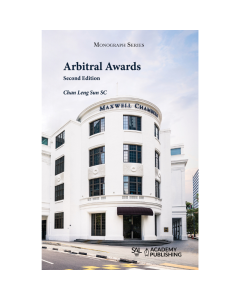
As with the 1st Edition, this 2nd Edition examines the law relating to arbitral awards from two perspectives: awards resulting from arbitrations that are seated in Singapore and awards made elsewhere that are being enforced in Singapore. Since the 1st Edition was published, Singapore has become a top choice for place of arbitration. The volume of cases arriving before Singapore courts enabled many principles of arbitration to be debated and judicially articulated. Jurisprudence from Singapore courts is closely studied in other countries. Likewise, the Singapore judiciary carefully considers case law from other jurisdictions when faced with legal conundrums. This reciprocal influence is largely driven by the confluence of arbitration laws underpinned by the New York Convention on the Recognition and Enforcement of Foreign Arbitral Awards 1958 and the UNCITRAL Model Law on International Commercial Arbitration, 1985 (amended 2006). This is especially so with regard to enforcement and challenges to arbitral awards, which are core topics in this book.
For this reason, the 1st Edition had been cited not only by the Singapore Supreme Court but also courts in jurisdictions from Australia to Brazil. Hence, this 2nd Edition should be of interest to all who have an interest in arbitration, whether in Singapore or elsewhere.
General Editor: Chan Leng Sun SC
Year of Publication: 2025
Page Extent: 450 pages
Member's Price: $60.00 (before GST)
Associate Student's Price: $48.00 (before GST)
Non-Member's Price: $90.00 (before GST)Get the Print + Digital bundle here.
-
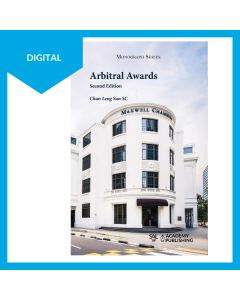
Please note that the digital copy can only be accessed via Academy Library, SAL’s proprietary eBook reader. The digital copy cannot be downloaded and is not available in any other format (e.g. PDF). For more information, please visit our FAQ page.
As with the 1st Edition, this 2nd Edition examines the law relating to arbitral awards from two perspectives: awards resulting from arbitrations that are seated in Singapore and awards made elsewhere that are being enforced in Singapore. Since the 1st Edition was published, Singapore has become a top choice for place of arbitration. The volume of cases arriving before Singapore courts enabled many principles of arbitration to be debated and judicially articulated. Jurisprudence from Singapore courts is closely studied in other countries. Likewise, the Singapore judiciary carefully considers case law from other jurisdictions when faced with legal conundrums. This reciprocal influence is largely driven by the confluence of arbitration laws underpinned by the New York Convention on the Recognition and Enforcement of Foreign Arbitral Awards 1958 and the UNCITRAL Model Law on International Commercial Arbitration, 1985 (amended 2006). This is especially so with regard to enforcement and challenges to arbitral awards, which are core topics in this book.
For this reason, the 1st Edition had been cited not only by the Singapore Supreme Court but also courts in jurisdictions from Australia to Brazil. Hence, this 2nd Edition should be of interest to all who have an interest in arbitration, whether in Singapore or elsewhere.
General Editor: Chan Leng Sun SC
Year of Publication: 2025
Page Extent: 450 pages
Member's Price: $60.00 (before GST)
Associate Student's Price: $48.00 (before GST)
Non-Member's Price: $90.00 (before GST)Get the Print + Digital bundle here.
-
![[Bundle] Arbitral Awards (2nd Ed)](https://d2oj3wdaa1r7o5.cloudfront.net/catalog/product/cache/2765542505660baab28ecd555e27366e/a/r/arbitral_awards_2nd_ed_bundle.png)
Please note that the digital copy can only be read on Academy Library, SAL’s proprietary eBook reader. It is not available in any other format (e.g. PDF). For more information, please visit our FAQ page.
As with the 1st Edition, this 2nd Edition examines the law relating to arbitral awards from two perspectives: awards resulting from arbitrations that are seated in Singapore and awards made elsewhere that are being enforced in Singapore. Since the 1st Edition was published, Singapore has become a top choice for place of arbitration. The volume of cases arriving before Singapore courts enabled many principles of arbitration to be debated and judicially articulated. Jurisprudence from Singapore courts is closely studied in other countries. Likewise, the Singapore judiciary carefully considers case law from other jurisdictions when faced with legal conundrums. This reciprocal influence is largely driven by the confluence of arbitration laws underpinned by the New York Convention on the Recognition and Enforcement of Foreign Arbitral Awards 1958 and the UNCITRAL Model Law on International Commercial Arbitration, 1985 (amended 2006). This is especially so with regard to enforcement and challenges to arbitral awards, which are core topics in this book.
For this reason, the 1st Edition had been cited not only by the Singapore Supreme Court but also courts in jurisdictions from Australia to Brazil. Hence, this 2nd Edition should be of interest to all who have an interest in arbitration, whether in Singapore or elsewhere.
General Editor: Chan Leng Sun SC
Year of Publication: 2025
Page Extent: 450 pages
Member's Price: $78.00 (before GST)
Associate Student's Price: $62.40 (before GST)
Non-Member's Price: $117.00 (before GST)

 Sign in
Sign in
